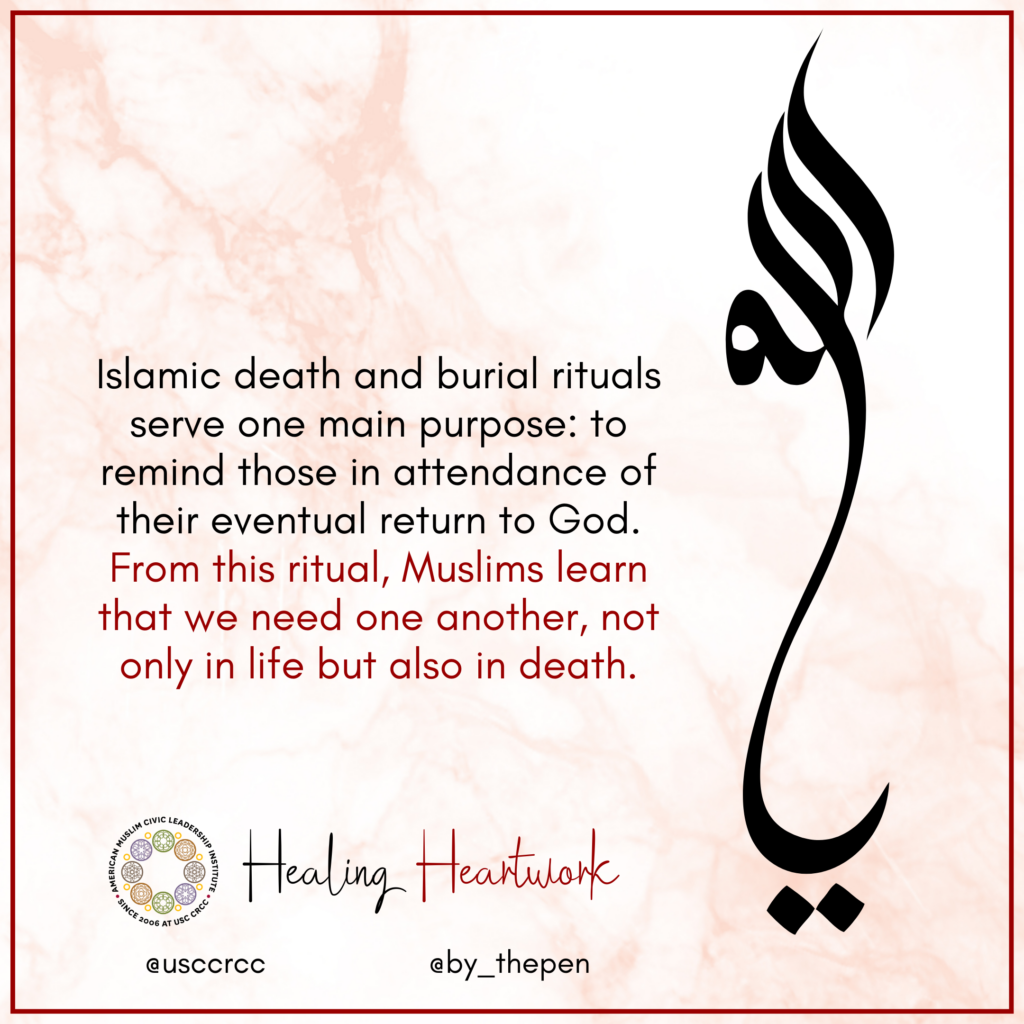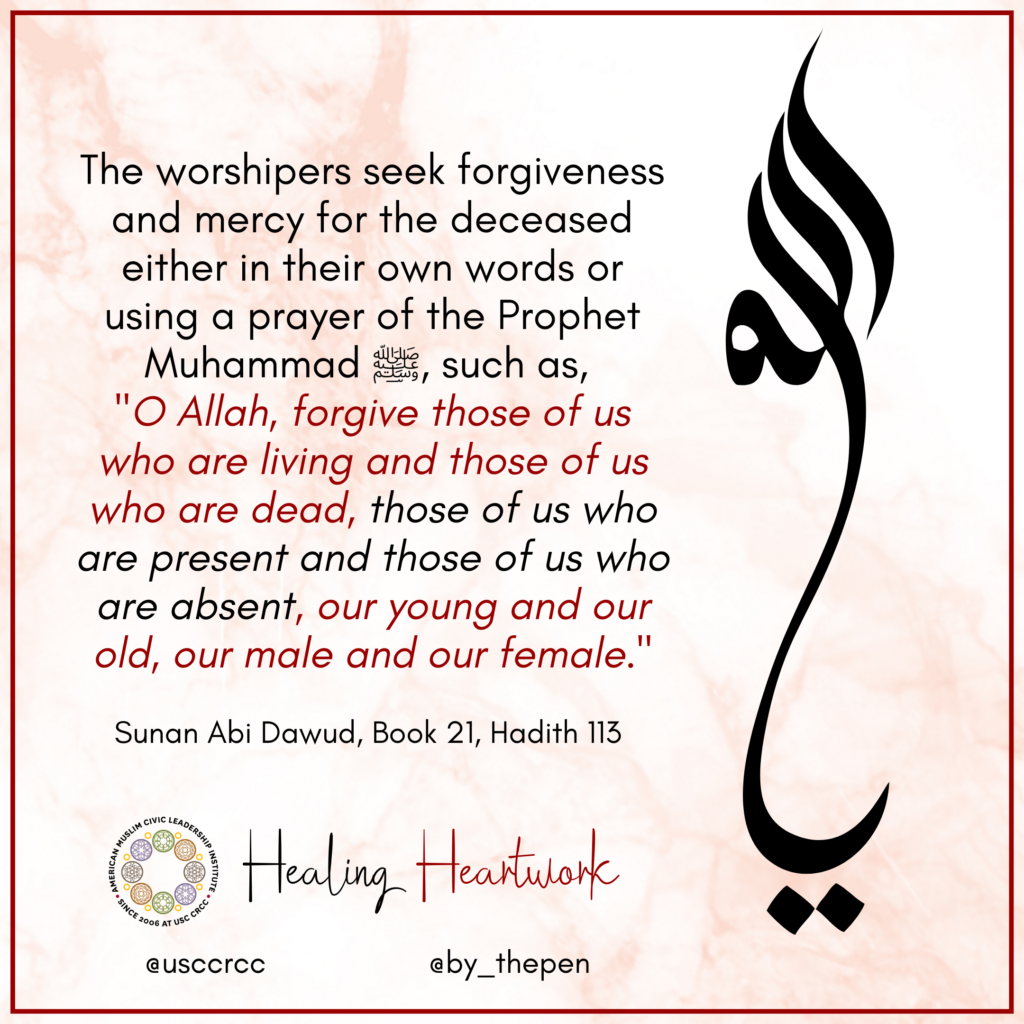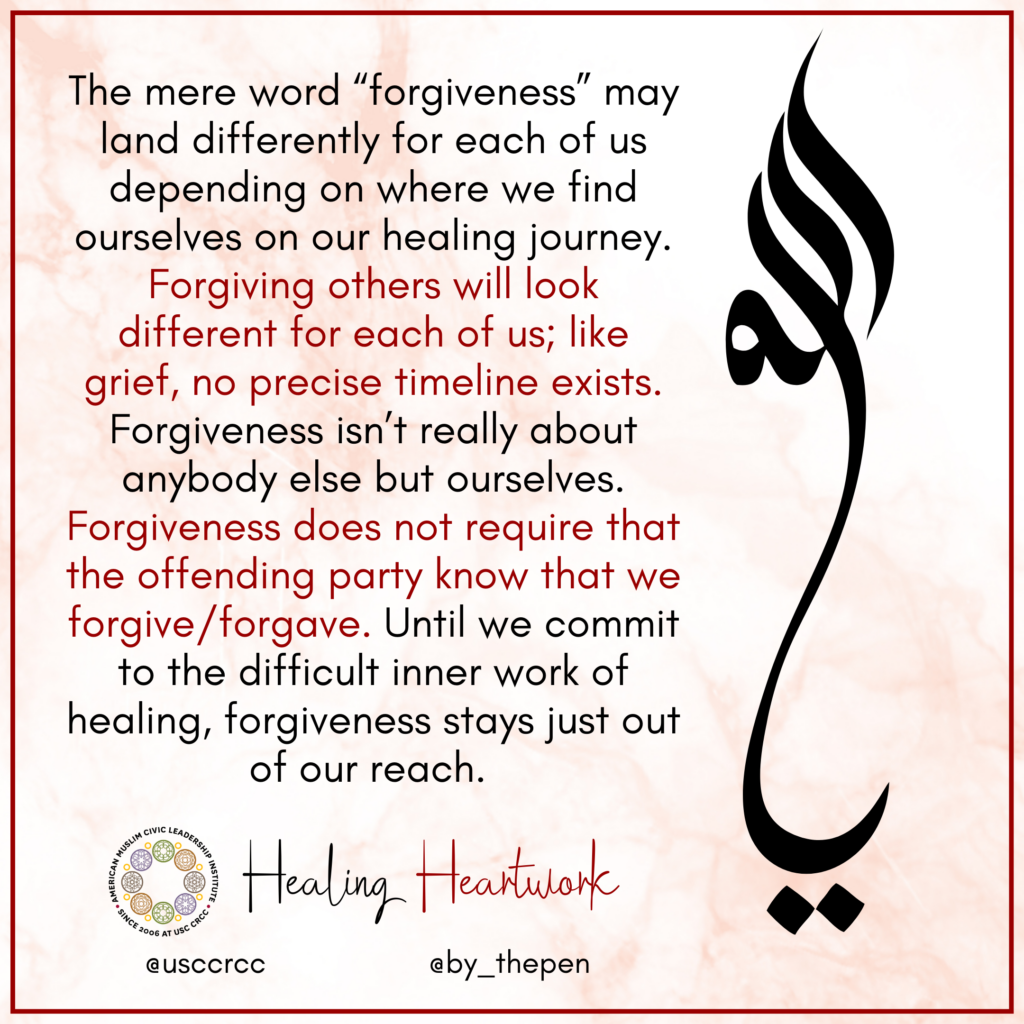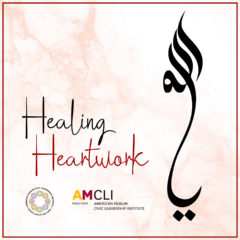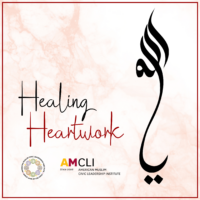Interdependence: the dependence of two or more people or things on each other; the quality or condition of being mutually reliant.
Islamic death and burial rituals serve one main purpose: to remind those in attendance of their eventual return to God. The middle ten days of Ramadan, centered on forgiveness, also provide an opportunity to focus on interdependence, a salient theme that emerges in the janazah funeral prayer. From this ritual, Muslims learn that we need one another, not only in life but also in death.
In Islam, the janazah funeral prayer falls under the category of fard kifayah, or communal obligation, meaning that if part of the community fails to fulfill this ritual, the entire Muslim community remains liable the eyes of God.
The janazah necessitates our participation; every aspect of it involves interaction with the deceased, the family of the deceased, and one another. As it happens, the etiquette of the janazah entails that all in attendance remain fully present in mind, body and spirit by avoiding idle talk and adopting quieted, mindful movements.
Even in death, God decrees that we lean on the community to help fulfill our religious and spiritual commitments. After the deceased undergoes the ritual of washing called ghusl al-mayyit, the family members, friends and/or trained community volunteers performing the ritual gently wrap the body in a white kafan shroud. The kafan shrouding purposefully evokes the image of the required uniform worn during the Hajj pilgrimage, further connecting the ritual to the concept of community. Muslims rarely, if ever, perform Hajj alone. The challenging journey necessitates the support of a group, even a small one, capturing an essential lesson about life and how God created humankind with an innate need for connection to and dependence on each other. We were not and are not meant to journey alone in this life.
Immediately following the ghusl and shrouding, the community gathers for the janazah prayer, a ritual that resembles the salat (canonical ritual prayer), except that in the janazah prayer, the worshiper remains standing throughout. Without the need for extra space for prostration, worshipers stand in lines closer to one another than when in salat. Imagine the lines of prayer in taraweeh during the month of Ramadan, but more tightly arranged, as though lined up in one large group embrace. Whenever possible, a family member of the deceased leads the community in prayer, centering the most vulnerable of the bereaved in this grounding practice. The janazah prayer includes four cycles of takbeerat, the announcing of “God is the Greatest,” to indicate the next step. Notably, two out of four of the cycles focus on the quality of forgiveness—in the third takbeer, the worshipers seek forgiveness and mercy for the deceased either in their own words or using a prayer of the Prophet ﷺ, such as, “O Allah, forgive those of us who are living and those of us who are dead, those of us who are present and those of us who are absent, our young and our old, our male and our female” (Sunan Abi Dawud • Book 21, Hadith 113). In the fourth takbeer, worshipers ask for forgiveness for themselves and their loved ones. In the ghusl and janazah practices, the need for family and community emerges, perhaps to offer a lasting opportunity for reconciliation and forgiveness.
The mere word “forgiveness” may land differently for each of us depending on where we find ourselves on our healing journey. Forgiving others will look different for each of us; like grief, no precise timeline exists. For some of us, forgiveness may simply look like our internal chaos settling into a peaceful equilibrium felt deeply in our soul.
Ultimately, Muslims strive to attain this station of al nafs al mutmainnah, or the soul at peace that returns to God at death, well-pleased and well-pleasing to God (Qur’an Surah Al-Fajr 89:27-30). Forgiveness isn’t really about anybody else but ourselves. Forgiveness does not require that the offending party know that we forgive/forgave.
When our pain remains unaddressed, a trauma response may look like hyper-independence, or the avoidance of needing others out of fear for our emotional, spiritual or physical safety. We may find ourselves recoiling from family and community. Due to negative experiences, our broken heart informs our thoughts such that we cannot trust others or may lead us to not even trust God.
Until we commit to the difficult inner work of healing, forgiveness stays just out of our reach. As long as our wounds—caused or exacerbated by those we may have loved and trusted—remain unhealed, our capacity to forgive remains hindered.
Muslim scholars established a special connection between our mind, thoughts and heart. For instance, the Qur’an mentions the function of the heart as one that “ponders” (Qur’an Surah Muhammad 47:24), and the Prophet Muhammad ﷺ pointed to his heart when locating the center of God-consciousness. Science, too, suggests that our brain and heart share similar neurons (thought-forming pathways) and communicate with each other to create a symbiotic relationship.
When considering the theme of forgiveness, then, let us note that a broken heart produces broken thoughts.
How do our thoughts or opinions of God impact our connection to the Divine?
How do our thoughts or opinions of others affect our connection with the community?
Does our hurt impede our ability to forgive others or ask for forgiveness?
Muslims believe that Allah, in His perfect knowledge, prescribes for us spiritual practices that can restore our broken hearts and thoughts. Our teachers share that the true secret to contentment is in one’s ability to accept the wisdom behind qadar, or Allah’s decree. One becomes a curious and open observer of what happens to oneself, rather than succumbing to one’s emotions.
In Islam, it is believed that by nourishing a good opinion of God as the Most Generous (the One who sends us the resources we need to mend), and by demonstrating beautiful patience and surrender through loss, we are showered with divine mercy and blessings (Qur’an Surah Al-Baqarah 2:157). Embracing the attitude of Ibn al Waqt (“child of the moment”) means accepting both the highs and lows of life as coming from the Most Merciful, while maintaining the proper ethos of patience during hardship. This approach helps practitioners of Islam find peace and wholeness through embracing surrender to God’s will. Through submission to each moment, an attitude is developed that allows us to lean into our function as “muslims.”
Many spiritual sages have written about spending entire lifetimes yearning for their soul’s release from this corporeal body in death and eventual reunion with the Beloved. Just as we need each other on this journey of life, we need our Best Companion even more so. As such, we grow in our ability to navigate forgiveness and repair our connections with others and with the Divine.
Islamic Death Meditation II
Based on the writings of Imam Abu Hamid Al-Ghazali in his book, The Remembrance of Death.
Listen to the meditation on YouTube or SoundCloud, or read it below:
We begin with Bismillah Al-Rahman Al-Raheem, in the name of God, the Most Gracious, the Most Compassionate.
Optional addition: I invite you to find a comfortable position. Let’s begin by taking a deep breath in through the nose, holding for a couple of heartbeats, and exhaling through the mouth. Let’s take one more deep breath in through the nose, hold, and exhale through the mouth. Continue to take these deep breaths, noticing the rise and fall of the stomach. Allow your forehead to relax, your jaw to drop slightly, and your arms to rest comfortably on your chair or in your lap. If you feel comfortable, let your eyes come to a close.
One of the main purposes of engaging in death meditations on a regular basis includes the goal of detaching from this world through knowing that nothing here lasts. Our spiritual teachers advise that we remember often those of our peers who have died before us to drive home this point of earthly fleetingness. In this moment, pause and recall someone you know personally who has passed away. Contemplate this person’s death and their physical form now beneath the earth. Now, compare their current position beneath the earth with how they moved and operated while alive. Recall how they appeared in their former positions and circumstances and meditate on the way in which the earth has now absorbed the beauty of their forms, and how they have left behind family and community and loved ones. Contemplate how all of their property remains behind, and how they inhabit their grave without any of those physical assets. Contemplate how all of the communal spaces, perhaps their mosque and social gatherings, continue to operate without their presence. In the physical sense, all traces of their form have vanished with their death.
As we sit in the here and now with breath in our lungs and blood pumping through our veins, we too will one day cease to physically exist. All those whom we love, all that we have been gifted and cherish, all that we possess, will continue to exist without us until their time, too, will come. So we pray to Allah for the capacity to forgive—forgive ourselves and those who have wronged us—and for forgiveness from the One who promises us forgiveness in the Hadith Qudsi, saying, “O son of Adam, so long as you call upon Me, and ask of Me, I shall forgive you for what you have done.”
Optional addition: Notice the anchoring of your body pressing into the seat, and release any tension in your legs. Feel your feet pressing into the ground beneath you, connecting you to the energy of the earth below. And as you continue inhaling through the nose and exhaling through the mouth, notice the spaciousness in your chest. And when you feel ready, gently open your eyes and as you awake, resolve to pursue your own healing on your forgiveness journey as God Most High gives you another day of life.
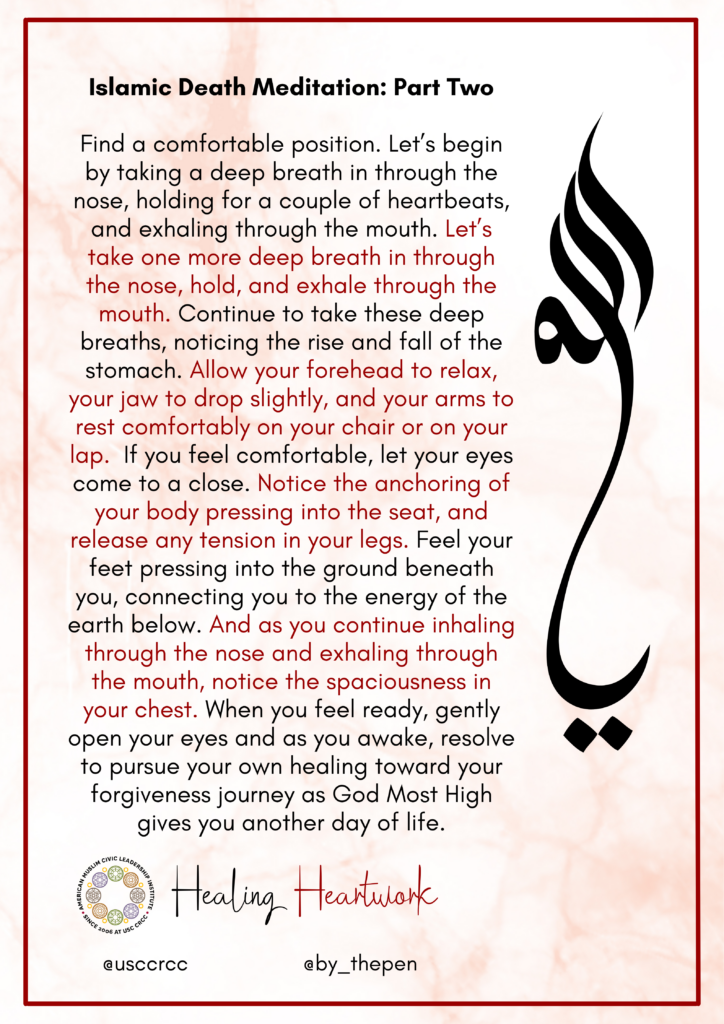
The Healing Heartwork Toolkit: Exploring Loss is a collaboration between AMCLI and Chaplain Sondos Kholaki.
Chaplain Sondos Kholaki is an AMCLI fellow and guest contributor with the USC Center for Religion and Civic Culture.

